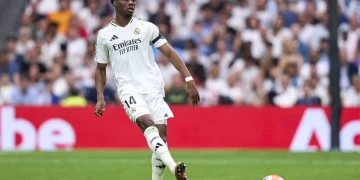The bombshell dropped on June 12, 2024: Xavi Hernández, who had tearfully announced his Barcelona exit in January, reversed his decision after a late-night meeting with president Joan Laporta. The abrupt U-turn—triggered by Laporta’s public “vote of confidence”—was framed as a truce between the coach and the board. But within 48 hours, leaks emerged of fractured player loyalties, contract revolts, and a power vacuum that threatens to derail the club’s fragile rebuild. This is not just a story about a coach staying or leaving; it’s a litmus test for whether Barcelona’s century-old mes que un club ethos can survive its modern identity crisis.
I. The Catalyst: Anatomy of a January Meltdown
Xavi’s initial resignation speech on January 27, 2024, laid bare systemic rot:
- Financial Paralysis: Despite La Liga’s 2023 salary cap relaxation, Barcelona’s wage bill still exceeded revenues by 18%, forcing fire sales (Gavi’s near-miss €50M exit).
- Tactical Stagnation: Once-pioneers of positional play, Barça ranked 9th in Europe for progressive passes (78.2/90) and 14th for high turnovers (9.1/90), per Opta.
- Locker Room Factions: Veterans (Lewandowski, Ter Stegen) clashed with La Masia graduates (Fermín López, Lamine Yamal) over playstyle priorities.
Xavi’s departure was meant to be a circuit breaker. Instead, it exposed Laporta’s lack of contingency planning.
II. Laporta’s Gambit: The “Trust Vote” as Political Theater
On June 10, Laporta convened an emergency press conference, flanked by Xavi and sporting director Deco. His three-pronged pitch:
- Economic “Levers 3.0”: Selling 49% of Barça Studios to Liberty Media for €200M (a deal critics call “selling the family silverware”).
- Sporting “New Deal”: Promising Xavi veto power over transfers—a direct rebuke to Deco’s failed 2023 signings (Íñigo Martínez, Oriol Romeu).
- Symbolic Gestures: Restoring the Johan Cruyff shield on kits, invoking Pep Guardiola’s 2008 “Project Reset.”
But the maneuver reeked of desperation. Laporta’s approval rating had plummeted to 34% (per Mundo Deportivo polls), with 68% of socios blaming him for the Lionel Messi fiasco and failed European Super League coup.
III. Locker Room Fault Lines: From Quiet Grumbles to Open Revolt
A. Generational Warfare
- Old Guard: Robert Lewandowski (35) openly criticized Xavi’s high-press demands: “My body isn’t 25 anymore.” His 12 non-penalty goals in 2023-24 marked a 40% drop from his Bayern peak.
- La Masia Faction: Gavi’s leaked WhatsApp messages called Lewandowski “a statue,” while Lamine Yamal’s camp demanded guaranteed starts (he’s played 60% of available minutes).
B. Contract Time Bombs
- Frenkie de Jong: Refused a third wage deferral, threatening legal action to reclaim €19M in deferred payments.
- Ronald Araújo: PSG’s €80M bid has his agent pushing for a release clause reduction from €1B to €60M.
C. Tactical Schisms
Xavi’s 4-3-3 hybrid system—a compromise between his Cruyffian ideals and pragmatism—satisfied no one:
- Midfield Overload: Pedri’s injury relapse (18 games missed) traced to covering for İlkay Gündoğan’s defensive lapses.
- Defensive Chaos: Jules Koundé’s 1v1 duel success rate (54%) ranked 42nd among La Liga CBs.
IV. Historical Precedents: When Trust Votes Backfire
Case 1: Louis van Gaal (2003)
Laporta’s first-term trust vote for Van Gaal imploded within 6 months, with players like Ronaldinho rebelling against rigid tactics. Parallels today: Xavi’s inflexibility with veterans.
Case 2: Ernesto Valverde (2020)
Bartomeu’s public backing of Valverde preceded a 8-2 Bayern humiliation. Key lesson: Managerial authority erodes when players sense boardroom doubt.
V. The Deco Factor: A Sporting Director at War with Himself
Deco’s 2023 appointment—a Laporta concession to superagent Jorge Mendes—has been disastrous:
- Failed Signings: Vitor Roque (€35M) scored once in 14 games; João Félix’s loan became a €20M sunk cost.
- Power Struggles: Deco’s push for Bernardo Silva (Mendes client) clashed with Xavi’s demand for Martín Zubimendi.
Insiders report Deco recently offered Xavi’s job to Thiago Motta, undermining the “vote of confidence.”
VI. Sociological Pressures: Catalonia’s Identity Politics
Xavi’s Catalan roots (he learned politics from grandfathers who fought Franco) make him a symbol of regional pride. But this complicates his authority:
- Anti-Madrid Obsession: His fixation on “beating Real even if it costs titles” alienates foreign players.
- Media Warfare: Pro-Laporta outlets (Sport) vs. anti-board platforms (El Nacional) turn every loss into a constitutional crisis.

VII. Pathways to Resolution (or Implosion)
Scenario 1: Xavi as Lame Duck
If Laporta’s fiscal promises fail (Liberty Media deal faces La Liga scrutiny), Xavi becomes a dead man walking. Exit by Christmas 2024.
Scenario 2: Player Purge
Selling Lewandowski (Al-Hilal offers €30M), Araújo, and De Jong could fund a rebuild—but risks fan revolt.
Scenario 3: Laporta’s Exit
Elections loom in 2026. Rival Victor Font’s polling surge (41%) suggests members crave a post-Laporta era.
VIII. The Silent Player: Joan Laporta’s Legacy Anxiety
Laporta’s memoir Barça o Mort reveals his existential fear: being remembered as the president who lost Messi and La Masia. His Xavi gambit is less about tactics than legacy preservation—a Hail Mary to avoid becoming a cautionary tale.
Epilogue: The Weight of the Crest
Barcelona’s crisis transcends football. It’s a referendum on whether a club built on Catalan identity, socialist principles (25% player pay cuts during COVID), and artistic football can survive in an era of Saudi-funded state clubs and hedge fund ownership.
Xavi’s second act—whether heroic or tragic—will hinge not on formations but on Laporta’s ability to sell hope. As the coach said in his reinstatement speech: “Barça isn’t broken. It’s just waiting for someone to relight the flame.” The question is whether that someone still exists in the age of flames extinguished by spreadsheets.






























Discussion about this post